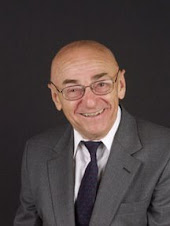"Posthumanism and transhumanism are opposites: one eliminates human consciousness, while the other suffuses it into everything. But they are the sort of opposites that meet at the extremes. Both agree that our current humanity is something transitional or wrong—something to be left behind. Instead of dealing with ourselves as we are, both imagine us altered in some dramatic way: either made more humble and virtuous in a new Eden, or retired from existence, or inflated to a level that sounds like that of gods.
I am a humanist; I cannot happily contemplate any of these alternatives. As a science fiction enthusiast, I used to have a weakness for transhumanism, however. Years ago, my mind was blown by a classic science fiction novel: Arthur C. Clarke's Childhood's End, published in 1953.
The story begins, as many in the genre do, with aliens arriving on Earth. They promptly shower us with gifts, which include hours of entertainment. "Do you realize that every day something like five hundred hours of radio and TV pour out over the various channels?" asks one character in the book, conveying 1953' s idea of a cornucopian abundance. But the bounty of the aliens comes with conditions: humans must stay on Earth and give up exploring space.
A few people resist the gilded cage, declining to watch the entertainment and proclaiming defiant pride in human achievements. But as time goes on, this aging minority is forgotten and a new generation emerges. They have new mental gifts, including the first stirrings of an ability to access the "Overmind," a mysterious shared consciousness in the universe, which has outgrown "the tyranny of matter."
That generation in turn gives way to the next, and these beings are hardly human at all. Needing no food, having no language, they simply dance for years, in forests and meadows. Finally they stop and stand motionless for a long time. Then they slowly dissolve upward, into the Overmind. The planet itself becomes translucent like glass and shimmers out of existence. Humanity and the Earth have gone, or rather, they have been transfigured and merged into a higher realm.
Such an ending for humanity is neither optimistic nor pessimistic, writes Clarke; it is just final. So is his novel, in a way. It pushes fiction to its limits. Earlier science fiction writers had also imagined a future in which humanity dies, notably Olaf Stapledon in his 1930 work, Last and First Men. But Clarke goes further, into a realm where there can be no more stories at all. Species have vanished; even matter has vanished, at least from Earth. He goes where Dante went in his Paradiso—and Dante complained in that work's first canto that this necessarily defeats the powers of any writer. To write about Heaven is "to go beyond the human"—transumanar—and, says Dante, this also means going beyond what language itself can accomplish.
When I first read Childhood's End, I loved its finale. Now I feel the melancholy of such a vision far more. It leaves me in mourning for those flawed, recognizable individuals that we are and for the details of our planet and our many cultures, all lost to a universal blandness. Every particularity has gone: the atoms of Democritus, Terence's nosy neighbor, Petrarch's lack of patience and Boccaccio's bawdy stories, the Lake Nemi ships and the fishlike Genoese divers, Aldus Manutius and his exuberance (" Aldus is here!"), students floating down rivers, Platina's recipe for grilled eel à l'orange, Erasmus's polite farts, the Encyclopédie (all 71,818 articles of it), Hume's games of backgammon and whist, Dorothy L. Sayers's comfortable trousers, Frederick Douglass's magnificently photographed face and his eloquent words, the priestly and poetic Kawi language, sea squirts, bloomers, the Esperanto plaque by Petrarch's beloved stream, M. N. Roy's good soups, ridiculous heraldry, Rabindranath Tagore's classes under the trees, the windows of Chartres, microfilms, manifestos, meetings, Pugwash, busy New York streets, the yellow line of morning. They have all gone up in the ultimate bonfire of the vanities. To me, this no longer says sublimity; it says, "How disappointing."
Where, in all this pure divinity and mysticism, is the richness of actual life? Also, where is our sense of responsibility for managing our occupancy of Earth? (Not that Clarke himself supported abdicating such responsibilities—quite the contrary.) And what about our relationships with fellow humans and other creatures—that great foundation for humanist ethics, identity, and meaning?
These dreams of elevation perhaps emerge from memories of being a small child, lifted out of a cradle by big arms. But the Earth is not a cradle; we are not alone here, since we share it with so many other living beings; and we need not wait to be spirited away. Give me, instead of the Overmind, or the sublime visions of any religion, these words of a more human wisdom by James Baldwin:
One is responsible to life. It is the small beacon in that terrifying darkness from which we come and to which we shall return. One must negotiate this passage as nobly as possible, for the sake of those who are coming after us.
A sense of sin is of no help on that journey; neither is a dream of transcendence. Dante was right: we really cannot transumanar, and if we have fun trying—well, that can produce beautiful literature. But it is still human literature.
I prefer the humanist combination of freethinking, inquiry, and hope. And, as the late scholar of humanism and ethics Tzvetan Todorov once remarked in an interview:
Humanism is a frail craft indeed to choose for setting sail around the world! A frail craft that can do no more than transport us to frail happiness. But, to me, the other solutions seem either conceived for a race of superheroes, which we are not . . . or heavily laden with illusions, with promises that will never be kept. I trust the humanist bark more.
Finally, as always, I am brought back to the creed of Robert G. Ingersoll:
Happiness is the only good.
The time to be happy is now.
The place to be happy is here.
The way to be happy is to make others so.
—




 Charles Darwin (
Charles Darwin (










